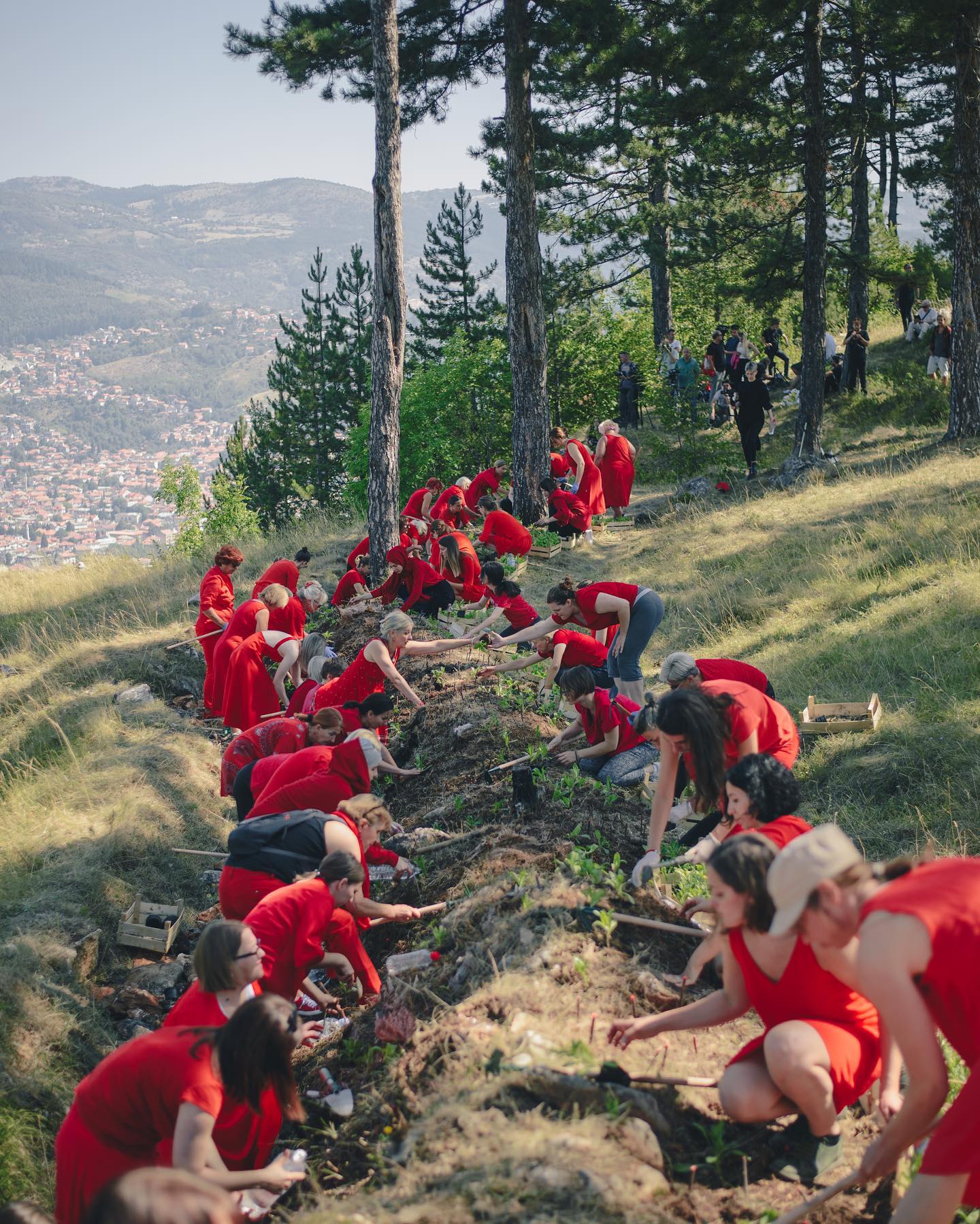Planetary Caring. Spatial practices and environmental justice from feminist, migrant and decolonial perspectives.
"Our Family Garden II: Prva Ženska Linija" is a collective project of Landscape Restoration through Participative Artistic Action (Performance). It involves 100 female participants, who will together plant 1000 medicinal calendula plants in the abandoned war trenches on the edges of Sarajevo (Zlatište, Federacija BiH) ©Smirna Kulenovic Artwork
The demand for environmental justice emerged from multiple social movements – such as the civil rights movement in the US or indigenous activist groups and feminist collectives in Latin America. They organize against the destruction of their environment and protest that social groups, who are already being discriminated against, are especially hit by ecological destruction. For example, inhabitants of neighborhoods (as well as cities and regions) with lower financial resources are often exposed to severe contaminations of air, water, and land. On a global level, in formerly colonized zones of the world, the environment – and as such the livelihood of its inhabitants – is unequally and unjustly being destroyed. For generations, inhabitants of formerly colonized zones have had to live with the constant exploitation and destruction of their environment. At the same time, the destruction of livelihoods leads to increased migration on the entire planet. In defiance of these circumstances, activist groups, as well as theorists and artists, who maintain and take care of their environment, develop models of protest and co-habitation aiming to resist the extractivist logic of capitalism.
Their models, interventions, and strategies depend on their economic, social, and geopolitical context. In European cities, climate activists glue their hands to streets, and planners demand to stop the construction of new buildings and the demolition of existing ones, investigating new ways of dealing with the existing built environment. In Ecuador, in 2008, a constitutional change granted the possibility to people, communities, and states to claim the right of nature (not to be destroyed) at the courts—as a result, activist groups sued the government because it had violated the rights of protected natural areas. Nevertheless, all protagonists share a quest to find out how we can live together on a damaged planet (Haraway) to build a more livable future, emphasizing the entanglements of human and non-human life.
In the seminar, we will work with texts, artworks, as well as examples from activism to better understand the complex relations between planetary caring and environmental (in)justice in the context of gender, migration, and decolonial movements. We will discuss spatial practices by exploring these different aspects in relation to each other. For that purpose, we will dive into the works of artists, curators, urban theorists, geographers, and especially activists as well as into local examples of ecological destruction and forms of resistance against it.
The starting point for our research is the existing environment—buildings, cityscapes and landscapes, industrial zones, and infrastructures, e.g., for transport or energy supply. We will look at how existing structures are dealt with, how global events and local situations relate to each other in this, and how actors can empower themselves to planetary caring.
Mierle Laderman Ukeles, Touch Sanitation Performance, 1979-80
Harun Farocki, The Silver and the Cross, 2010
Amanda Strong und Leanne Betasamosake Simpson, Biidaaban (The Dawn Comes), 2018
Smirna Kulenović, Our Family Garden II: Prva Ženska Linija, 2021
Macarena Gomez-Barris, The Extractive Zone, 2017
Donna Haraway, Staying with the Trouble, 2016
Elke Krasny, “Maßstäbe der Sorge. Feministische Raumpraxen,” 2022
Karin Reisinger, “Struggles at the ‘Peripheries’: Situated knowledge production and feminist visions for post-extractive environments,” 2022
Floating University, Seedbox for Urban Climate Activism, 2021
Klima Biennale Wien, 2024
Oliver Ressler, Dog Days Bite Back, 2024 (Belvedere 21)
Astrida Neimanis, Rachel Loewen Walker, “Weathering: Climate Change and the “Thick Time” of Transcorporeality,” 2014
T. J. Demos, “Extinction Rebellions, Afterimage,”, 2020
Vergès, Françoise. “Capitalocene, Waste, Race, and Gender,” 2019
Donna Haraway. 2016. Staying with the Trouble. Making Kin in the Chthulucene. Durham and London: Duke University Press, 2016.